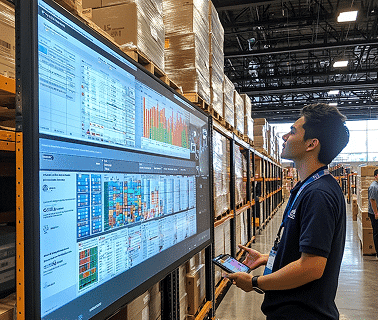The COVID-19 pandemic that broke out in 2020 severely impacted the international supply chain as we knew it and is still having an impact today. Some of the problems in the supply chain have lessened, but things will probably never be the same. We need to be prepared to face difficulties that no one in the international trade sector has ever faced before, since the new normal we’re entering will be unlike anything in the sector’s history.
Critical issues that need to be addressed
- Logistics and commerce face labor shortage due to challenges like attracting and maintaining key employees (such as truck drivers) and competing for them with other industries that offer better work-life balance and perks.
- The worldwide increase in fuel prices.
- The increasing importance of technology in managing supply chains, especially for keeping meticulous track of shipments.
- Conflict in Ukraine and the prospect of blocking the Chinese merchant marine shipping lines continue to destabilize international situations.
- Ecosystem effects caused by supply chains.
A firm grasp of supply chain management (SCM) principles has never been more important for exporters and importers. End customers no longer consider a delivery period of five to seven days acceptable in this fast-paced modern world. Companies will thrive and expand if their SCM processes are continuously optimised to match the needs of their customers.
What is Supply Chain Management?
IBM defines SCM as:
“Supply chain management is the handling of the entire production flow of a good or service—starting from the raw components all the way to delivering the final product to the consumer. A company creates a network of suppliers (“links” in the chain) that move the product along from the suppliers of raw materials to those organizations that deal directly with users.”
Stacey Lewis, owner of Eternity Modern, a Vancouver-based furniture supplier with warehouses and delivery facilities worldwide, says there are many types of supply chain management:
Just-in-time manufacturing: Just-in-time manufacturing reduces inventory by producing things just when needed. This helps organizations save storage expenses and avoid stockpiling raw materials.
Vendor management involves analyzing supplier performance, setting expectations, and establishing quality and delivery standards. This ensures vendors satisfy company needs and deliver products on schedule and to specifications.
Inventory management: Inventory management helps track stock levels to satisfy customer demand. Just-in-time manufacturing and order batching are examples of inventory management.
Transportation management: Coordinating supplier-to-customer shipping. Planning routes, scheduling shipments, and managing transportation providers.
Major players in Supply Chain Management
Most enterprises use one of two following approaches:
- To better manage the entire process from start to finish, they employ the services of third-party logistics (3PL) firms. C.H. Robinson, XPO Logistics, J.B. Hunt, and Kuehne+Nagel are all significant third-party logistics (3PL) providers in international trade.
- The system of Next-day delivery from big-box warehouses has replaced logistics that were previously handled by the 3PLs, and experts predict that this is the future of 3PLs. This approach allows companies to handle the entire operation in-house including purchasing of ships, trucking of businesses, etc. In the wake of the disruptions to supply chains in 2020, this approach has gained traction, but businesses with a focus on speedy delivery have already begun moving away from outsourcing to completing the work in-house long before that.
Ronnie Adcock, senior vice president at Sedgwick, claimed that “in this day and age, it is the speed of delivery of a product that wins over the consumer,” and that next-day delivery was the wave of the future for 3PLs. Third-party logistics providers (3PLs) who can offer manufacturers speedy service like this will be crucial as such options have become part of consumers’ expectations.
Characteristics of a strong 3PL partner:
- Strong global presence
- Technologically savvy
- Innovation
- Focus on customer success
They should ensure that in one call, their clients get the answers they need and are satisfied with results. There’s nothing more costly or frustrating than a process disruption or non-delivery.
Why does Supply Chain Management matter in the 21st century?
Profit margins are often directly tied to how well a company manages its supply chain. Companies can reduce their inventory costs, transportation costs, and other operational expenses by streamlining their supply chains. Further, effective supply chain management allows businesses to get their products to customers more quickly, which can give them a significant edge in the market.
More sales and satisfied customers are the result of a dependable supply chain that gets products to customers quickly. And in our ever-evolving world, businesses that can provide a streamlined logistics process and a professional response to problems (which inevitably arise) are invaluable.
Gain in-depth knowledge of Supply Chain Management with an online MBA in SCM through Online Manipal
Supply Chain Management has become a crucial part of the product and service-based businesses. Most of the top firms across the world are looking to streamline their services through effective SCM strategies. For this, they are on the lookout for highly knowledgeable personnel who can handle the process efficiently. If you’re a graduate looking to explore this domain of work or a working engineer looking to get into a pivotal role in the organization, an online course in SCM helps the cause. Manipal University of Jaipur (MUJ) offers an MBA in supply chain management which has a comprehensive curriculum that’s in line with current business trends. The expert faculty and extensive e-learning will help you gain in-depth knowledge of the subject and prepare you for a successful career in SCM.
Prepare for your next career milestone with us










